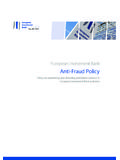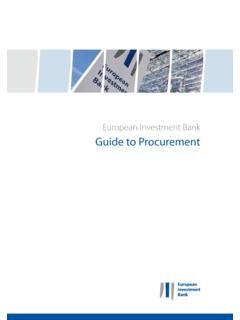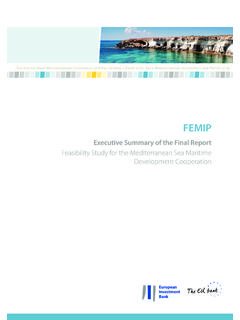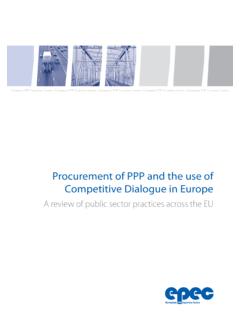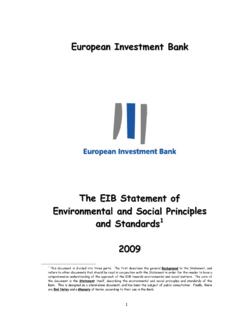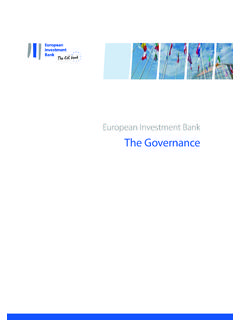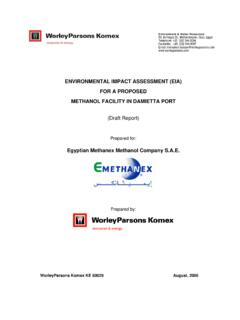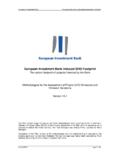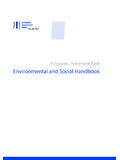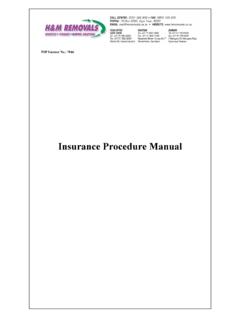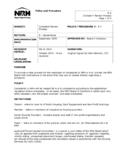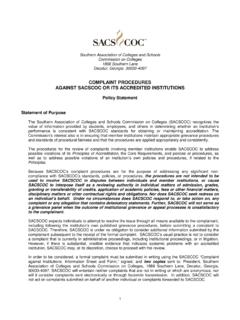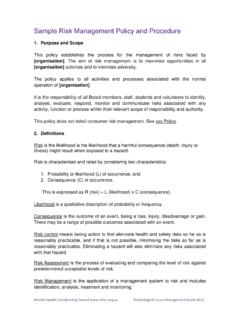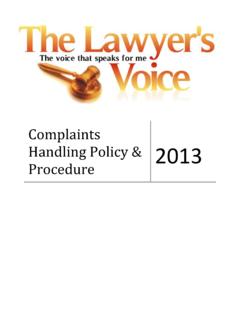Transcription of Complaints Mechanism - Principles, Terms of Reference and ...
1 CORPORATEEIB Group Complaints Mechanism policy EIB GROUP Complaints Mechanism policy EIB GROUP Complaints Mechanism policy Page 1 Table of Contents 2 PREAMBLE .. 4 6 1. Scope .. 6 2. Guiding principles .. 6 3. Maladministration .. 7 4. The Complaint .. 7 General .. 7 Categories of Complaints and types of 8 Admissibility .. 8 Timeframe for dealing with a complaint .. 9 Escalation to the European Ombudsman .. 10 Disclosure and Publication 10 Data Protection .. 11 5. EIB Group Complaints Mechanism Division .. 11 The Role of the Complaints Mechanism Division .. 11 Authority and responsibility .. 12 Functions .. 12 Regular reporting.
2 13 6. Complaints handling .. 13 Tasks .. 13 Methodology of the inquiry .. 14 Consultation .. 15 7. External relations .. 16 8. Publication and Awareness .. 16 9. Review and Consultation .. 17 Annex 1 THE EUROPEAN OMBUDSMAN .. 18 1. Who can complain? .. 18 2 How to Complain .. 18 3. Subject of the complaint .. 18 a. Eligibility .. 18 b. Time limit for 18 c. Outcome of the procedure before the European Ombudsman .. 18 EIB GROUP Complaints Mechanism policy Page 2 Glossary CSOs: Civil Society Organisations Conclusions Report: the report containing a record of the EIB-CM s inquiry as well as of its findings and conclusions in cases that have undergone a compliance review.
3 EIB-CM: EIB Group Complaints Mechanism Division. EIB Group: Formed in 2000, it comprises the EIB and the EIF. EIB: European Investment Bank. EIB Group Governing bodies: Depending on the EIB Group member concerned by the complaint, this term may indicate the EIB Board of Directors and/or the EIB Management Committee (EIB) or the EIF Chief Executive/Deputy Chief Executive (EIF) and the EIF Board of Directors. EIB Group Management: Depending on the EIB Group member concerned by the complaint, this term may indicate the EIB Management Committee and/or EIB Directors General (EIB) or the EIF Chief Executive (EIF). EIB Group s staff: All EIB Group members of staff holding an employment contract with the EIB or the EIF.
4 EIB project: A project receiving the EIB s financial assistance. EIF: European Investment Fund. EIF CE/DCE: EIF Chief Executive/Deputy Chief Executive. EO: European Ombudsman. EDPS: European Data Protection Supervisor. Initial Assessment Report: The report containing (i) an initial assessment of the concerns raised by the complainants regarding environmental and social impacts or governance aspects of operations/projects financed by the EIB Group and (ii) concrete proposals on how to proceed with a collaborative process or an investigation/compliance review. Mediation Report: The report containing (i) a description of the mediation process and (ii) its outcome, which is communicated to the mediation parties and to the EIB Management and/or EIF CE/DCE.
5 Collaborative resolution process: The process followed by the EIB-CM to bring parties to mutually accepted and sustainable solutions. This includes several types: facilitation of information sharing, dialogue/negotiation, joint fact-finding and formal mediation/conciliation. Mediation Agreement: The covenant containing the points of agreement and the commitments undertaken by the mediation parties; once signed by the latter, it closes the mediation process managed by the EIB-CM. Maladministration: As defined in paragraph 3. Personnel: The relevant departments of human resources in the EIB Group. policy : The EIB Group document illustrating how the EIB Group seeks to fulfil its mission in a specific field through the establishment of standards.
6 Procedures: An EIB Group document translating standards into operational Terms by establishing the sequence of actions or instructions to be followed with a view to ensuring the EIB Group s compliance with its standards. Project s area of influence : Areas, individuals and communities impacted beyond the footprint of the project or activity by cumulative impacts from further planned development of the project or other sources or similar impacts in the geographical area, any existing project or condition, and other project-related EIB GROUP Complaints Mechanism policy Page 3 developments that can realistically be expected at the time the due diligence is undertaken.
7 In addition to the area of geographical or spatial influence, temporal influence should also be determined. Regulations: Secondary sources of EU Law; these documents are of a binding legislative nature. Working day: Any day (other than Saturday and Sunday, legal holidays in the Grand Duchy of Luxembourg or bank holidays) on which the EIB Group can conduct business. Standards: Minimum quality requirements of the EIB Group s action ( with regard to the environmental and social impact of EIB-financed projects, the EIB establishes environmental and social standards for its operations). TFEU: Treaty on the Functioning of the European Union.
8 EIB GROUP Complaints Mechanism policy Page 4 PREAMBLE The EIB Group consists of the European Investment Bank (EIB)1 and the European Investment Fund (EIF)2. The EIB is the financing body of the European Union (EU), and its capital is subscribed by the EU Member States. The EIB s Statute is a Protocol attached to the Treaty on European Union and the Treaty on the Functioning of the European Union. When performing its activities, the EIB Group is bound by the Treaties and the EIB and EIF Statutes as well as by the relevant legislative and regulatory framework of the European Union. The EIB Group shall therefore operate in such a way as to ensure that its various activities support and implement EU policies.
9 Within the Group, the EIB mainly provides long and medium-term bank loans, whilst the EIF specialises in private equity operations and providing guarantees and counter-guarantees for the benefit of small and medium-sized enterprises (SMEs). A non-exhaustive list of the EIB and EIF policy documents is available respectively on the EIB website at , and on the EIF website at As part of the EU institutional framework and within the limits established by the Treaties, the EIB and the EIF are subject to the jurisdiction of the Court of Justice of the European Union, while the European Court of Auditors examines the use of EU funds managed by the EIB Group.
10 Moreover, the EIB Group s activities fall within the mandate of the European Anti-Fraud Office (OLAF), as laid down by EC Regulation 883/2013, and are subject to the remit of the European Ombudsman (EO) and of the European Data Protection Supervisor (EDPS). The EIB s conduct may also be challenged before the Aarhus Convention Compliance Committee. The Treaties and the EIB s Statute provide the EIB with operational and financial autonomy to enable it to perform effectively as a financial institution. The EIB is an important partner in the financial sector, especially when borrowing on the capital markets and financing projects. The EIB also works closely with other International Financing Institutions (IFIs), Multilateral Development Banks (MDBs) and Bi-lateral Development Banks (BDBs), in particular when it operates in the framework of the development aid and external cooperation policies of the EU.

